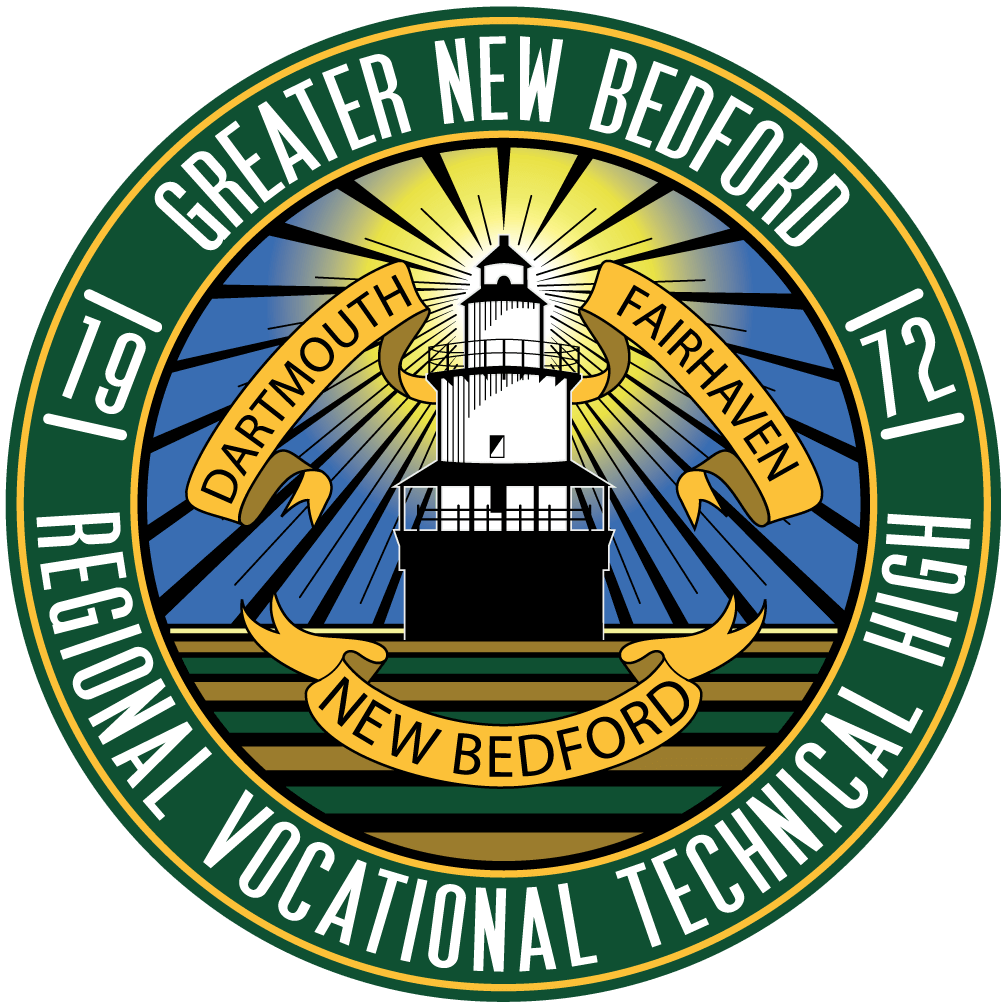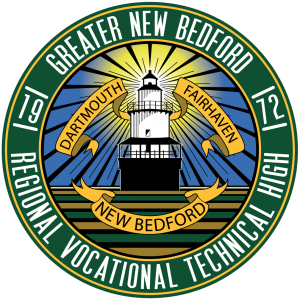2024 – 2025
Information Technology
Guy Shepherd, Academy C Administrator – Ext. 113
Course & Program of Studies
Statement of Purpose
The Information Technology program at GNBRVTHS is dedicated to providing students with the skills and knowledge necessary to succeed in the dynamic field of technology. Our program emphasizes:
- Hands-on Learning: Practical experience with industry-standard hardware and software.
- Problem-Solving and Critical Thinking: Developing strong problem-solving and critical thinking skills.
- Communication and Teamwork: Effective collaboration with peers and professionals.
- Ethical and Legal Considerations: Understanding ethical and legal implications of technology use.
- Lifelong Learning: Fostering a passion for continuous learning and adaptation to technological advancements.
By combining technical skills with strong problem-solving and communication abilities, our program prepares students for a wide range of careers in the technology industry.
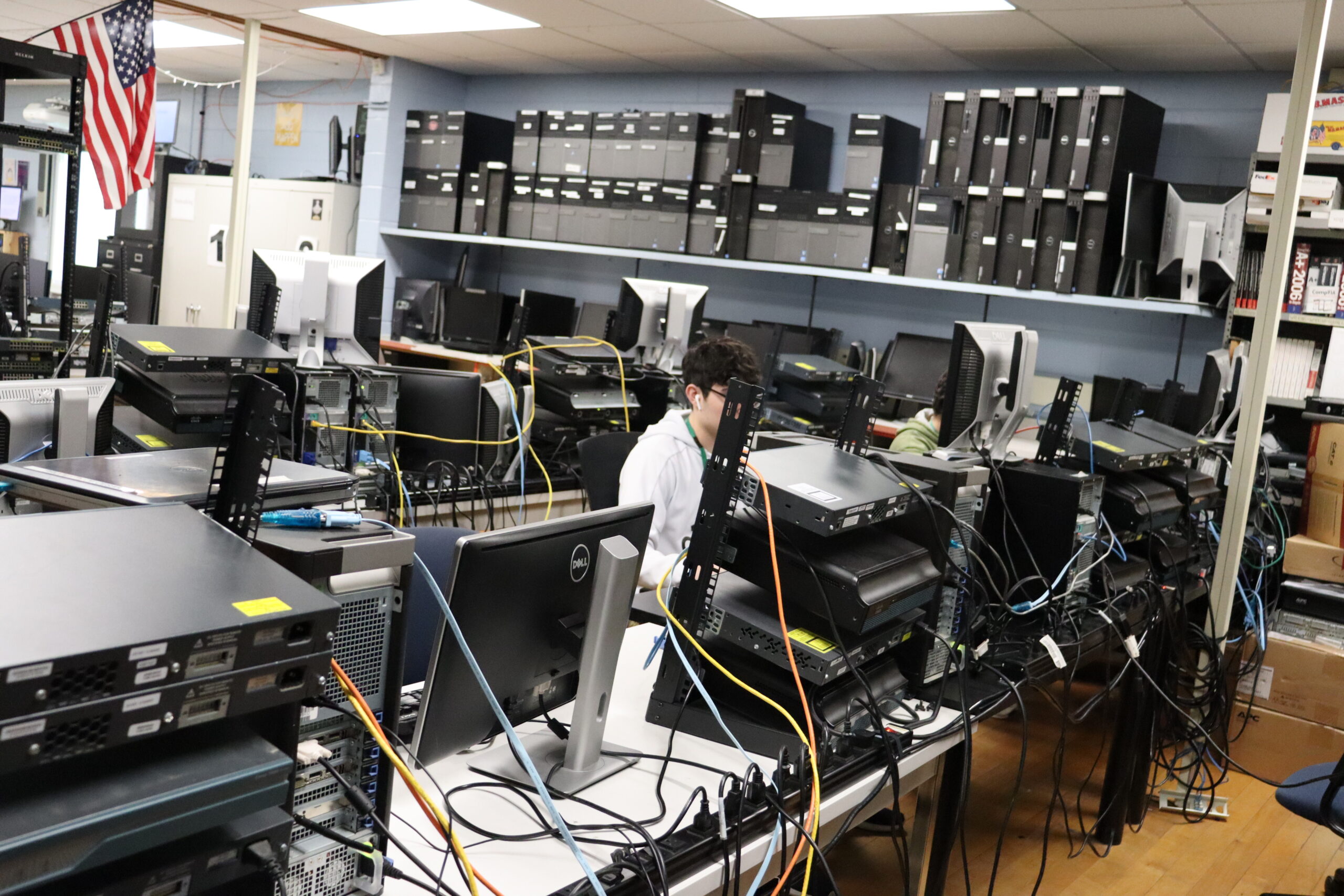
Exploratory Program
The Information Technology Exploratory program is designed to provide students with a broad overview of the field of information technology. This course introduces students to the fundamental concepts and skills required for success in various IT roles.
Key areas of exploration include:
- Computer Hardware: Understanding the components of a computer system, including hardware and software.
- Basic Networking: Learning about network concepts, such as LAN, WAN, and the internet.
- Web Design and Development: Exploring the basics of web design, including HTML, CSS, and web development tools.
- Programming Fundamentals: Introduction to programming concepts, such as variables, data types, control flow, and functions.
- Digital Literacy: Developing digital literacy skills, including online research, digital communication, and cybersecurity.
- Problem-Solving and Critical Thinking: Applying logical thinking and problem-solving techniques to IT challenges.
Through a combination of hands-on activities, projects, and presentations, students will gain a solid foundation in information technology and be able to make informed decisions about their future career paths.
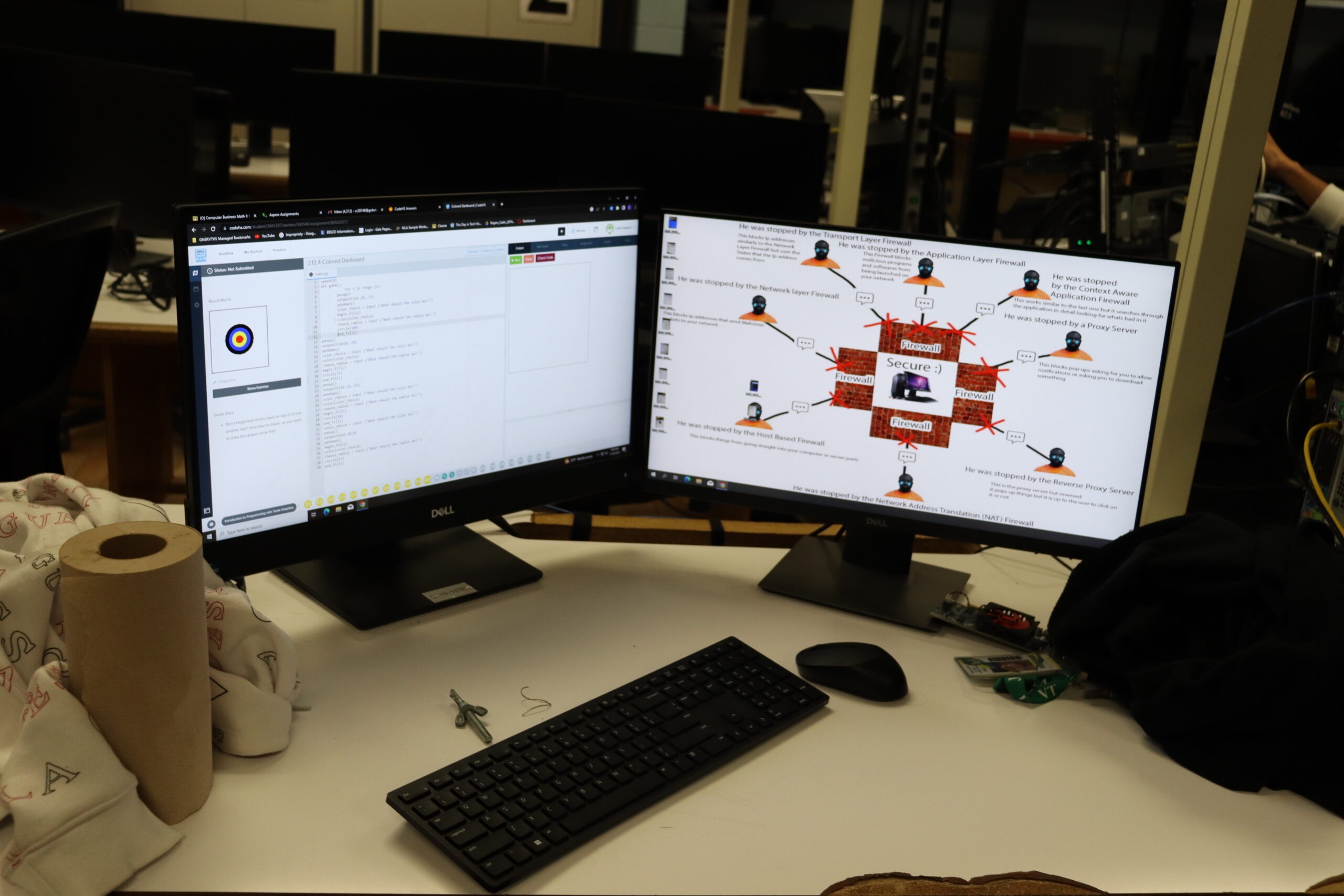
Freshman Program
Students in Information Technology rotate between Information Support Services and Networking AND Programming and Web Development every cycle.
By the end of Freshman year, students will have the knowledge to select either Information Support Services and Networking OR Programming and Web Development as a Career Pathway for the remaining three years.
Information Support Services and Networking
- Networking Fundamentals:
- Network topologies, protocols, and troubleshooting techniques.
- Hands-on experience with network devices (routers, switches, modems).
- Cybersecurity:
- Understanding cybersecurity threats, vulnerabilities, and best practices.
- Implementing security measures to protect systems and data.
- Technical Writing and Documentation:
- Writing clear and concise technical documentation, such as user manuals and troubleshooting guides.
- Developing effective communication skills for technical audiences.
Programming and Web Development
- Web Development:
- HTML, CSS, and JavaScript for creating interactive web pages.
- Web design principles and best practices.
- Responsive web design for various devices.
- Programming Fundamentals:
- Introduction to programming concepts, including variables, data types, control flow, and functions.
- Learning programming languages like Python or Java.
- Developing simple programs and algorithms.
- Digital Graphics and Design:
- Using graphic design software (e.g., Adobe Photoshop, Illustrator) to create visual designs.
- Understanding color theory, typography, and layout principles.
- Digital Math and Number Systems:
- Binary, hexadecimal, and decimal number systems.
- Boolean logic and digital circuits.
By the end of the freshman year, students will have a solid foundation in information technology, including networking, web development, and programming. They will be prepared to delve deeper into specialized areas in their sophomore year.
Information Support Services & Networking (ISS)
Sophomore Year (ISS)
Building on the foundation established in the freshman year, the sophomore year curriculum delves deeper into specific areas of information technology.
Key areas of focus include:
- Computer Hardware:
- In-depth understanding of computer hardware components, including CPUs, RAM, storage devices, and input/output devices.
- Troubleshooting hardware issues and performing hardware upgrades.
- Operating Systems:
- Installing, configuring, and troubleshooting Windows and Linux operating systems.
- Understanding file systems, user management, and system security.
- Networking Fundamentals:
- Network topologies, protocols, and troubleshooting techniques.
- Configuring network devices like routers and switches.
- Implementing network security measures, including firewalls and intrusion detection systems.
- Technical Communication:
- Developing effective technical writing skills, including writing clear and concise documentation.
- Creating professional presentations and reports.
- Customer Support and Service:
- Providing excellent customer service and technical support.
- Troubleshooting hardware and software issues for end-users.
By the end of the sophomore year, students will have a solid understanding of computer hardware, operating systems, and networking fundamentals. They will be well-prepared to pursue advanced courses in networking, cybersecurity, programming, or web development.
Junior Year (ISS)
This course provides a comprehensive introduction to networking concepts and technologies, focusing on the fundamentals of network architecture, protocols, and troubleshooting. Key topics include:
- Network Fundamentals:
- Network topologies (bus, star, ring, mesh)
- Network protocols (TCP/IP, HTTP, FTP, SMTP)
- Network devices (routers, switches, hubs)
- IP Addressing:
- IP addressing schemes (IPv4, IPv6)
- Subnetting and Supernetting
- IP address configuration
- Ethernet Technology:
- Ethernet frames and cabling standards
- Switch and hub configurations
- Ethernet troubleshooting
- Network Security:
- Basic network security concepts, including firewalls and intrusion detection systems
- Password policies and user access control
Through hands-on labs and simulations, students will gain practical experience in:
- Configuring network devices
- Troubleshooting network issues
- Implementing basic network security measures
- Using network diagnostic tools
By the end of this course, students will have a solid foundation in networking concepts and be prepared for more advanced topics in their senior year.
Senior Year (ISS)
The Cisco CCNA Routing and Switching curriculum provides a solid foundation in networking fundamentals, covering a wide range of topics, from basic network concepts to advanced routing and switching protocols.
Key Topics Covered:
- Network Fundamentals:
- Network topologies (bus, star, ring, mesh)
- Network protocols (TCP/IP, HTTP, FTP, SMTP)
- Network devices (routers, switches, hubs)
- IP addressing (IPv4 and IPv6)
- Subnetting and Supernetting
- Routing Protocols:
- RIP (Routing Information Protocol)
- OSPF (Open Shortest Path First)
- EIGRP (Enhanced Interior Gateway Routing Protocol)
- Switching Technologies:
- VLANs (Virtual LANs)
- Spanning Tree Protocol (STP)
- Port Security
- Network Security:
- Firewall configuration
- Access control lists (ACLs)
- Network intrusion detection systems (IDS)
Hands-on Experience:
- Cisco Packet Tracer: A powerful network simulation tool used to practice network configurations and troubleshooting.
- Real-World Labs: Hands-on experience with Cisco routers and switches in a lab environment.
- Industry Certifications: Preparing for and taking industry certifications, such as the CCNA Routing and Switching certification.
By the end of the CCNA Routing and Switching curriculum, students will be well-prepared to:
- Configure and troubleshoot routers and switches
- Implement network security measures
- Design and implement small to medium-sized networks
- Solve network problems and optimize network performance
This comprehensive curriculum provides students with the skills and knowledge needed to succeed in a variety of networking roles, including network administrator, network engineer, and systems administrator.
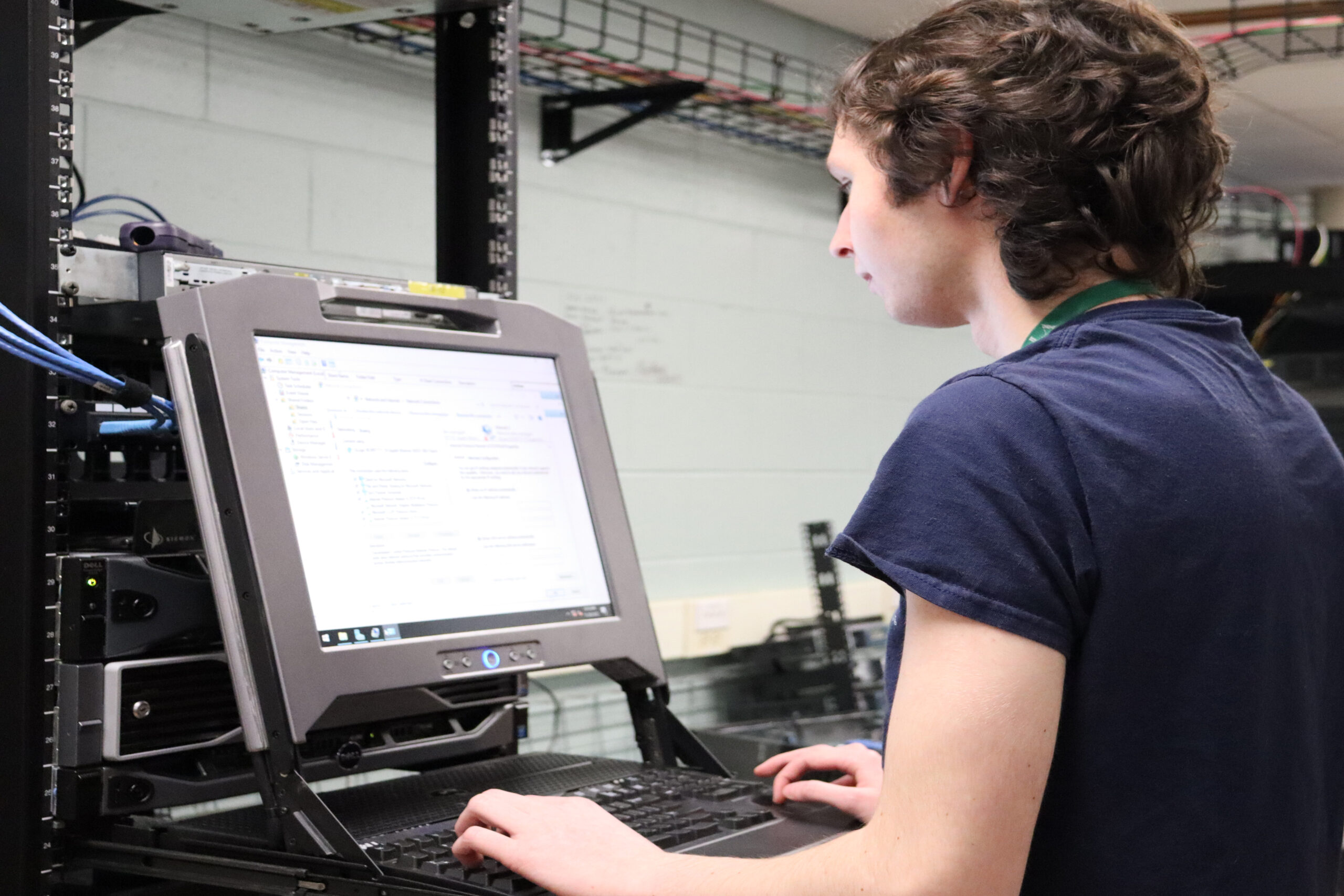
Programming & Web Development (PW)
Sophomore Year (PW)
Building on the foundation established in the freshman year, the sophomore year curriculum delves deeper into specific areas of information technology.
- Web Development Fundamentals:
- Understanding the World Wide Web and its history
- HTML basics (structure, semantics, and syntax)
- CSS basics (styling elements, layout, and responsiveness)
- Web browsers and their rendering engines
- Web Design and User Experience:
- Principles of design (color theory, typography, layout)
- User interface (UI) and user experience (UX) design
- Responsive web design
- Accessibility and inclusive design
- Web Development Tools:
- Text editors and IDEs
- Version control systems (Git)
- Web development frameworks (e.g., Bootstrap, React)
- Web Project Planning and Management:
- Project planning and time management
- Collaboration and teamwork
By the end of this course, students will be able to:
- Design and develop basic websites using HTML and CSS.
- Create and manage databases using Microsoft Access.
- Understand the fundamentals of computer programming.
- Apply problem-solving and critical thinking skills to solve programming challenges.
- Work effectively in teams to complete software development projects.
Junior Year (PW)
This course provides a comprehensive introduction to web development, covering the fundamentals of HTML, CSS, and JavaScript.
Core Topics:
HTML (HyperText Markup Language):
- Structure and semantics of HTML documents
- HTML elements and tags
- Headings, paragraphs, links, images, and lists
- Tables, forms, and frames
- HTML5 and its new features (semantic elements, multimedia, offline storage)
CSS (Cascading Style Sheets):
- CSS syntax and selectors
- Styling text, colors, fonts, and backgrounds
- Layout techniques (CSS layout, flexbox, grid)
- Responsive web design
- CSS preprocessors (e.g., Sass, Less)
JavaScript:
- JavaScript basics (variables, data types, operators)
- Control flow (conditional statements, loops)
- Functions and object-oriented programming
- DOM manipulation (modifying HTML elements)
- Event handling
- Asynchronous programming (AJAX)
Web Development Frameworks and Tools:
- Popular frameworks (e.g., React, Angular, Vue)
- Version control systems (Git)
- Web development tools (e.g., text editors, debugging tools)
Web Design Principles:
- User experience (UX) design
- User interface (UI) design
- Accessibility and inclusive design
- Web standards and best practices
Web Project Development:
- Planning and project management
- Wireframing and prototyping
- Responsive web design
- Testing and debugging
- Deployment and hosting
Advanced Topics:
- Server-Side Scripting:
- PHP basics
- Database integration (MySQL, PostgreSQL)
- Web application development
- Web Security:
- Protecting websites from attacks (e.g., SQL injection, cross-site scripting)
- Implementing security best practices
- Web Performance Optimization:
- Improving website loading speed and performance
- Minification and compression
- Caching techniques
By the end of this course, students will be able to:
- Design and develop functional and visually appealing websites.
- Write clean and efficient HTML, CSS, and JavaScript code.
- Understand web development principles and best practices.
- Debug and troubleshoot web applications.
- Collaborate with other developers to create complex web projects.
This course provides a strong foundation in web development, enabling students to pursue careers as web developers, web designers, or full-stack developers.
Senior Year (PW)
This senior-level course focuses on advanced web development techniques, web maintenance, and web server administration.
Core Topics:
Web Development:
- HTML5 and CSS3:
- Advanced HTML5 features (semantic HTML, canvas, web storage)
- CSS3 layout techniques (flexbox, grid)
- Responsive web design
- JavaScript:
- DOM manipulation
- Asynchronous programming (AJAX)
- Event handling
- Web APIs (e.g., Geolocation, Web Storage, Canvas)
- Server-Side Scripting:
- PHP, Python, or Node.js
- Database integration (MySQL, PostgreSQL)
- Server-side rendering and templating
- Web Frameworks:
- Popular frameworks (e.g., React, Angular, Vue)
- Component-based development
- State management and routing
Web Maintenance:
- Website Security:
- Protecting websites from vulnerabilities (e.g., SQL injection, cross-site scripting)
- Implementing security best practices
- Website Performance Optimization:
- Minifying and compressing files
- Optimizing images
- Leveraging browser caching
- Web Server Administration:
- Configuring web servers (Apache, Nginx)
- Deploying web applications
- Monitoring server performance
- Content Management Systems (CMS):
- Using CMS platforms (e.g., WordPress, Drupal)
- Creating and managing website content
- Implementing SEO and marketing strategies
Projects and Hands-On Experience:
- Web Development Projects:
- Building dynamic websites with interactive features.
- Creating web applications that interact with databases.
- Developing responsive websites for various devices.
- Website Maintenance:
- Updating and maintaining the school’s website.
- Troubleshooting website issues.
- Implementing security measures.
- Web Server Administration:
- Configuring and managing web servers.
- Deploying and hosting websites.
By the end of this course, students will be well-prepared for careers in web development, web design, and web administration. They will have the skills to create complex, dynamic, and secure websites, and to maintain and optimize existing websites.
Related Courses
Sophomore Related 1 (ISS & PW)
Computer Science / MOS
Computer Science is a comprehensive course that equips students with essential computer skills and knowledge. Key areas of focus include:
Microsoft Office Suite:
- Word Processing: Mastering advanced word processing techniques, including formatting, styles, templates, and mail merge.
- Spreadsheets: Creating complex spreadsheets, using formulas, functions, and data analysis tools.
- Presentations: Designing and delivering effective presentations using PowerPoint.
Computer Fundamentals:
- Number Systems: Understanding binary, decimal, and hexadecimal number systems.
- Computer Hardware and Software: Learning about computer components and operating systems.
- Internet and Networking: Exploring the internet, basic networking concepts, and cybersecurity.
Digital Literacy:
- Digital Citizenship: Understanding ethical and legal issues related to technology use.
- Online Safety and Security: Protecting personal information and avoiding online threats.
- Critical Thinking and Problem-Solving: Applying logical thinking and problem-solving skills to technology-related challenges.
By the end of the course, students will be proficient in using Microsoft Office Suite, understand basic computer concepts, and be able to apply technology effectively in various contexts. They will also be well-prepared to take the Microsoft Certified Application Specialist exam.
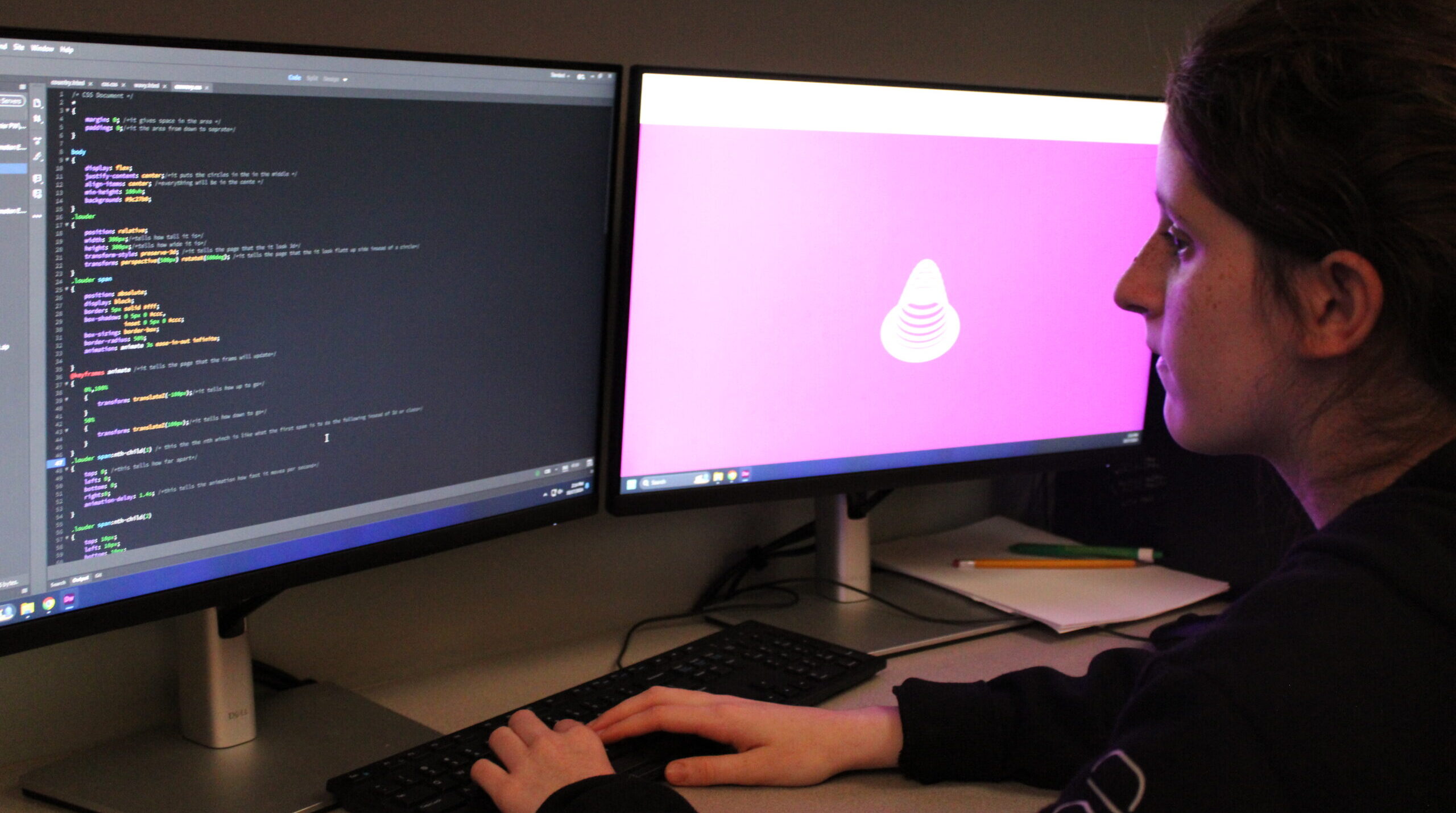
Sophomore Related 2 (ISS & PW)
Related Database Administration
This course provides a comprehensive introduction to database design and management, focusing on the following key areas:
Database Concepts:
- Entity-Relationship Modeling (ERM): Understanding the fundamental concepts of ERM, including entities, attributes, and relationships.
- Normalization: Applying normalization techniques to design efficient and well-structured databases.
- Data Types and Constraints: Selecting appropriate data types and defining constraints to ensure data integrity.
- SQL (Structured Query Language): Learning SQL commands to interact with databases, including SELECT, INSERT, UPDATE, DELETE, and JOIN operations.
Database Design and Implementation:
- Database Design: Creating conceptual, logical, and physical data models.
- Database Implementation: Using database management systems (DBMS) like Microsoft Access or MySQL to design and implement databases.
- Data Manipulation: Inserting, updating, and deleting data in databases.
- Querying Data: Writing SQL queries to retrieve specific information from databases.
- Form and Report Design: Creating user-friendly forms and reports to interact with and present data.
Database Administration:
- Database Installation and Configuration: Installing and configuring database servers and clients.
- Database Security: Implementing security measures to protect database integrity and confidentiality.
- Database Performance Tuning: Optimizing database performance through indexing, query optimization, and database maintenance.
- Backup and Recovery: Developing and implementing backup and recovery strategies.
By the end of this course, students will be able to:
- Design and implement efficient database solutions.
- Write SQL queries to retrieve and manipulate data.
- Use database management tools to create and manage databases.
- Troubleshoot database problems and optimize performance.
- Understand the role of databases in information systems.
This course provides a strong foundation for further study in database administration, data analysis, and data science.
Junior Related 1 (ISS & PW)
Computer Business Math I
This course provides a solid foundation in mathematics, specifically focusing on the mathematical concepts relevant to information technology. Key areas of focus include:
Digital Logic and Number Systems:
- Binary, Octal, and Hexadecimal: Understanding these number systems and their conversions.
- Boolean Algebra: Applying Boolean logic to solve problems and design digital circuits.
- Logic Gates: Learning about the different types of logic gates (AND, OR, NOT, XOR) and their applications.
Discrete Mathematics:
- Set Theory: Understanding sets, subsets, and set operations.
- Counting Principles: Permutations, combinations, and probability.
- Graph Theory: Analyzing graphs and networks.
Calculus and Differential Equations:
- Limits and Derivatives: Understanding the concept of limits and derivatives.
- Integration: Applying integration techniques to solve problems.
- Differential Equations: Solving differential equations using various methods.
Linear Algebra:
- Matrix Operations: Performing operations on matrices, including addition, subtraction, multiplication, and inversion.
- Systems of Linear Equations: Solving systems of linear equations using various methods.
- Vector Spaces: Understanding the concept of vector spaces and linear transformations.
Statistics and Probability:
- Descriptive Statistics: Measures of central tendency, dispersion, and data visualization.
- Probability Theory: Probability distributions, conditional probability, and Bayes’ theorem.
- Statistical Inference: Hypothesis testing and confidence intervals.
By the end of this course, students will be able to:
- Apply mathematical concepts to solve IT-related problems.
- Analyze and interpret data.
- Design and implement algorithms.
- Understand the mathematical foundations of computer science.
This course will provide students with a strong mathematical foundation, enabling them to excel in advanced IT courses and pursue careers in software engineering, data science, or cybersecurity.
Junior Related 2 (ISS & PW)
Entrepreneurship / Portfolio / MOS
This course provides a comprehensive overview of entrepreneurship and business management, equipping students with the knowledge and skills to start and run their own businesses. Key components of this course include:
Entrepreneurial Mindset:
- Identifying Business Opportunities: Recognizing market needs and developing innovative ideas.
- Developing a Business Plan: Creating a comprehensive business plan, including executive summary, market analysis, financial projections, and operational plan.
- Risk Management: Assessing and mitigating risks associated with starting a business.
Business Operations:
- Marketing and Sales: Developing effective marketing strategies, including branding, advertising, and public relations.
- Financial Management: Understanding financial statements, budgeting, and cash flow management.
- Human Resource Management: Hiring, training, and managing employees.
- Operations Management: Managing day-to-day operations, including inventory control, supply chain management, and quality control.
Technology and Business:
- E-commerce: Leveraging e-commerce platforms to sell products and services online.
- Digital Marketing: Using digital marketing tools to reach target audiences.
- Social Media Marketing: Utilizing social media platforms to build brand awareness and customer engagement.
- Cybersecurity: Protecting business assets from cyber threats.
By the end of this course, students will be able to:
- Develop innovative business ideas.
- Create comprehensive business plans.
- Manage finances effectively.
- Market products and services effectively.
- Lead and manage teams.
- Adapt to changing market conditions.
This course will prepare students to start their own businesses or pursue careers in entrepreneurship, management, or related fields.
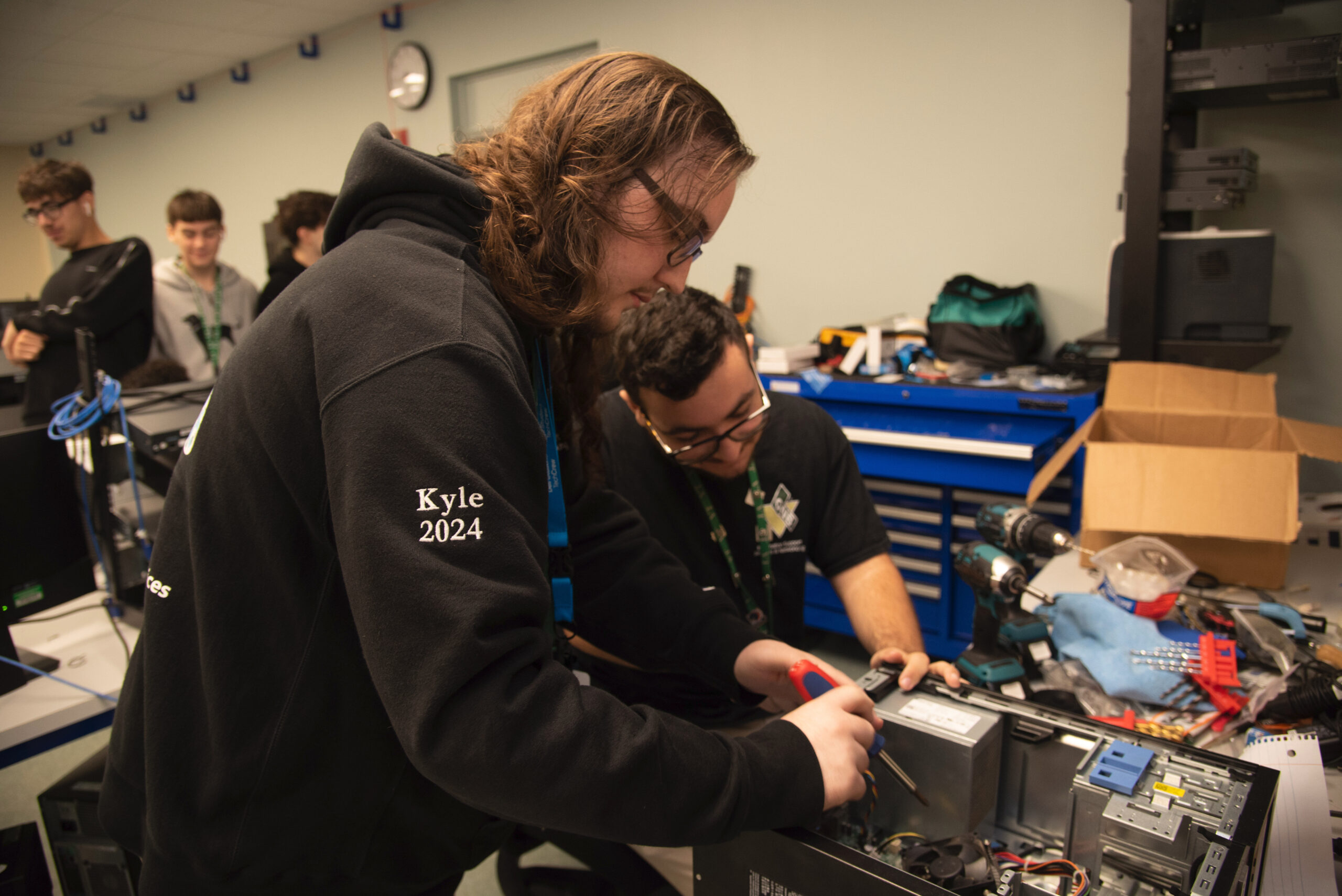
Senior Related 1 (ISS & PW)
Technical Career Communications & Development
This course focuses on developing strong technical communication skills, essential for success in the IT field. Key areas of focus include:
- Technical Writing:
- Writing clear, concise, and accurate technical documentation, such as user manuals, installation guides, and troubleshooting guides.
- Understanding technical writing principles, including audience analysis, organization, and style.
- Using technical writing tools and software to create professional documents.
- Technical Presentations:
- Developing effective presentations using presentation software (e.g., PowerPoint).
- Designing visually appealing slides and delivering engaging presentations.
- Practicing public speaking skills and handling questions from the audience.
- Technical Reports:
- Writing comprehensive technical reports, including research papers, project reports, and lab reports.
- Following specific report formats and citation styles.
- Online Communication:
- Effective use of email, instant messaging, and other online communication tools.
- Professional online etiquette and netiquette.
- Technical Writing Tools:
- Using technical writing tools like MadCap Flare or Adobe FrameMaker to create complex technical documentation.
By the end of this course, students will be able to:
- Write clear, concise, and accurate technical documentation.
- Deliver effective technical presentations.
- Use technical writing tools to create professional documents.
- Communicate effectively with technical and non-technical audiences.
- Apply critical thinking and problem-solving skills to technical communication tasks.
This course will prepare students for a variety of careers in the IT field, including technical writing, documentation, and training.
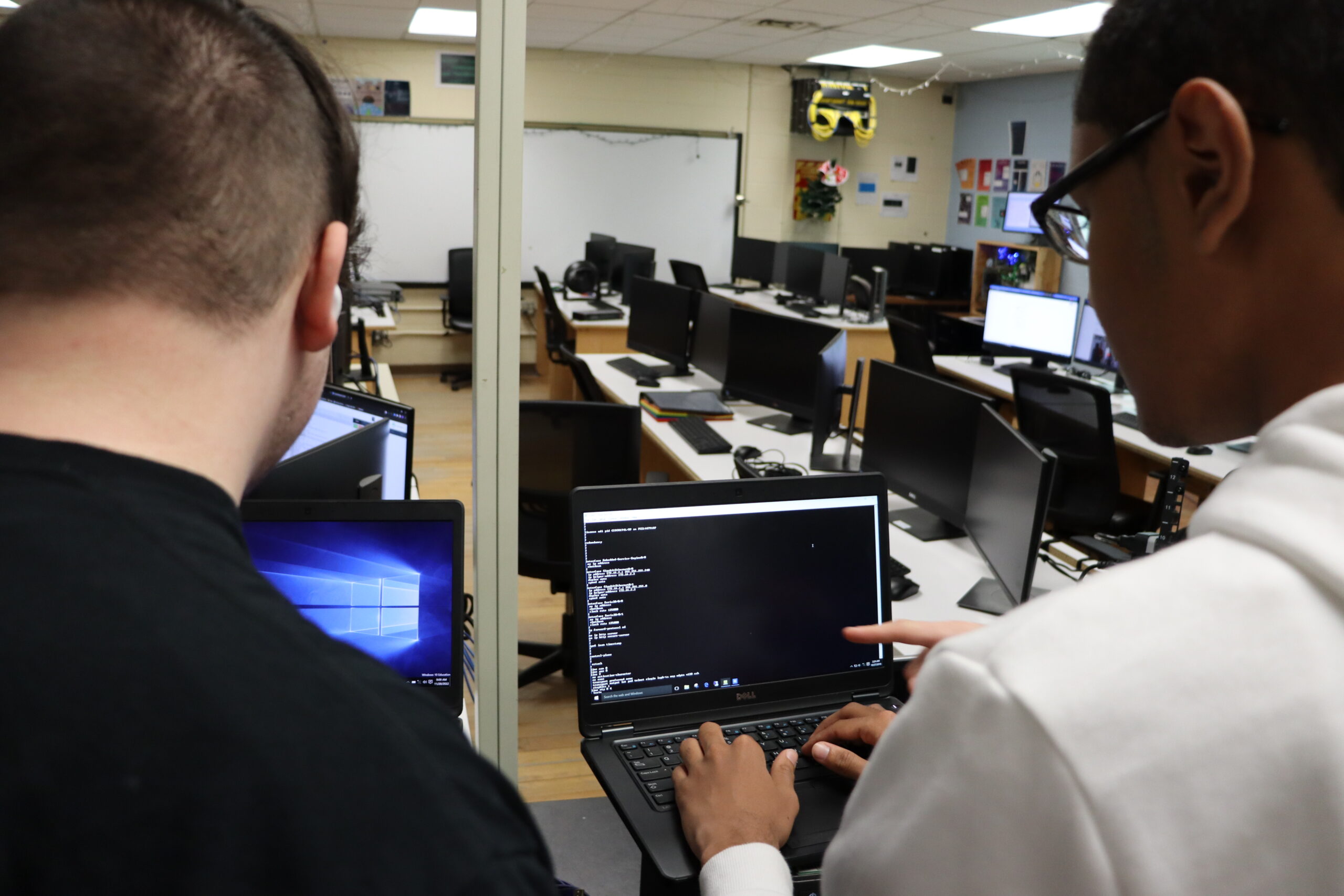
Senior Related 2 (ISS & PW)
Computer Business Math II
Key Topics:
Digital Logic and Number Systems:
- Binary, Octal, and Hexadecimal: Understanding these number systems and their conversions.
- Boolean Algebra: Applying Boolean logic to solve problems and design digital circuits.
- Logic Gates: Learning about the different types of logic gates (AND, OR, NOT, XOR) and their applications.
Discrete Mathematics:
- Set Theory: Understanding sets, subsets, and set operations.
- Counting Principles: Permutations, combinations, and probability.
- Graph Theory: Analyzing graphs and networks.
Calculus and Differential Equations:
- Limits and Derivatives: Understanding the concept of limits and derivatives.
- Integration: Applying integration techniques to solve problems.
- Differential Equations: Solving differential equations using various methods.
Linear Algebra:
- Matrix Operations: Performing operations on matrices, including addition, subtraction, multiplication, and inversion.
- Systems of Linear Equations: Solving systems of linear equations using various methods.
- Vector Spaces: Understanding the concept of vector spaces and linear transformations.
Statistics and Probability:
- Descriptive Statistics: Measures of central tendency, dispersion, and data visualization.
- Probability Theory: Probability distributions, conditional probability, and Bayes’ theorem.
- Statistical Inference: Hypothesis testing and confidence intervals.
By the end of this course, students will be able to:
- Apply mathematical concepts to solve IT-related problems.
- Analyze and interpret data.
- Design and implement algorithms.
- Understand the mathematical foundations of computer science.
This course will provide students with a strong mathematical foundation, enabling them to excel in advanced IT courses and pursue careers in software engineering, data science, or cybersecurity.
Certifications
Information Technology
- Career Safe Certification, recognized by the Occupational Safety and Health Administration (OSHA)
- Cisco Certified Entry Networking Technician (CCENT) Certification
- Microsoft Office Specialist (MOS) Certification
Programming & Web Design
- Career Safe Certification, recognized by the Occupational Safety and Health Administration (OSHA)
- Cisco Certified Entry Networking Technician (CCENT) Certification
- Adobe Certified Associate (ACA) – A global, validated, standards-based training and certification program for Adobe products.
Career Opportunities
Information Technology
- Network Architect
- Information Security Analyst
- Software Developer
- Computer Systems Analyst
- Data Scientist
- Computer Programmer
- GNB Voc-Tech Technician
- User Support Specialist
- Graphic Designer
- Cyber Incident Response
- Cyber Risk and Strategic Analysis
- Computer Maintenance Technician
Programming & Web Design
- Entry-level Web Development
- Computer Programming Internships
- Assistant Network Administrator
- Computer Help Desk
- Digital Forensics and Forensics Analysis
- Network Designer
- Network Engineer
- Systems Administrator
- Computer Maintenance Technician
- Cyber Risk and Strategic Analysis
- Digital Forensics and Forensics Analysis
- Software Assurance
- Database Administrator
Post-Secondary Education
Information Technology
- Bristol Community College
- UMass Dartmouth
- Bridgewater State University
- Johnson and Wales University
- ITT Tech
- New England Institute of Technology
- Southern New Hampshire University
- Wentworth Institute of Technology
Programming & Web Design
- Bristol Community College
- UMass Dartmouth
- Bridgewater State University
- Johnson and Wales University
- ITT Tech
- New England Institute of Technology
- Southern New Hampshire University
- Wentworth Institute of Technology


